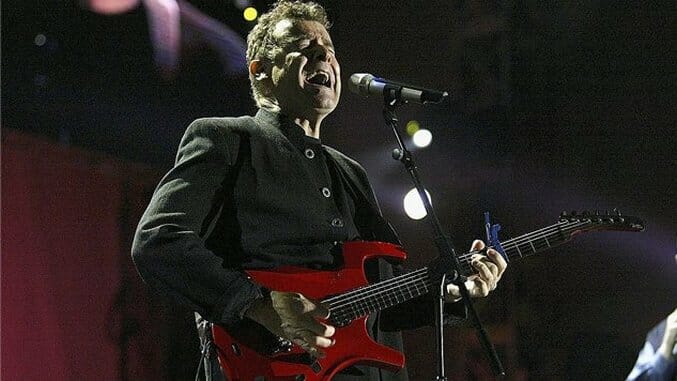10 Essential Johnny Clegg Songs
Hear the best songs by the South African musician/activist on the eve of his retirement
Photo by Frank Micelotta / Getty Images
Johnny Clegg is the voice of transition in South Africa. The product of an English father and Rhodesian mother, Clegg co-founded apartheid South Africa’s first multiracial band, Juluka, in 1979, when doing so was a criminal act. With Juluka, its successor Savuka (which means, “they have risen” in Swahili) and as a solo artist since 2002, Clegg has paired Zulu rhythms and vocals with succinct pop melodies borrowed from British new-wave with a social consciousness that echoed American and British folk music. Despite harassment and arrest, his sound—joyous, multicultural and principled like the end of a spear—filled venues and represented a nation opening itself to the rest of the world.
Clegg’s popularity peaked in the early and mid-1990s—after Graceland, but before the beginning of a new sociopolitical South Africa. It meant touring with likes of Paul Simon, George Michael and Steve Winwood, late night TV appearances in America and, at one point, being as popular as Michael Jackson in France.
But after 13 albums and 40 years of music and dance, Clegg announced his retirement this year. His 2015 diagnoses of pancreatic cancer has returned and, in order to spend his remaining time with family, he has embarked on one last world tour he is calling The Final Journey (which began last week and arrives Stateside in October). While it’d be easy to call Clegg’s music an artifact of an era, his knighthoods in three countries, half-dozen honorary degrees and being declared a national treasure in his homeland prove otherwise. These 10 songs are essential to understanding the musical and cultural weight of a man who remains, as David S. Coplan describes in his book In Township Tonight: South Africa’s Black City Music and Theatre, “a remarkable example of what can be done despite apartheid and of what might be possible without it.”
1. “Woza Friday”
This tight working-for-the-weekend number concluded Juluka’s third album, 1982’s Ubuhle Bemvelo (Natural Beauty). Composed entirely of Zulu traditional songs, “Woza” is the album’s rare track with an English chorus, a stabbing thumb in the eye of apartheid cultural prohibitions on South Africans of different races speaking each other’s language. The shimmering guitar riffs, deep bass choruses set a template Clegg would both stick with and remix throughout his career. “Woza” the band’s first hit single, is its coming out party.
2. “I Call Your Name”
When playing this song live, Clegg often jokingly labels it a “Zulu Constantina Sex Jive Rock Song.” As the biggest single from the second Savuka album, 1989’s Shadow Man, it features Clegg on the accordion leading a melody that seems like it’s spinning in circles beneath the-Kalahari sky, yet inside his comfort zone.
However, that engaging melody and rhythm hides the song’s depths of pain and loneliness. “I Call Your Name” is a song about missing someone (or their music), written a few short years after the end of Juluka. It’s vintage Clegg—arms outstretched, danceable, polymorphic—and represents his version of “Someday We’ll Be Together” or “Have You Ever Seen the Rain,” whatever your favorite song about the band breaking up is.
3. “Impi”
Clegg wrote this tale of the military victory of Zulu warriors (“Impi” means “war” or “formation of soldiers”) over the British at 1879’s Battle of Isandlwana for Juluka’s second album, African Litany, in 1982. Styled, perhaps deceptively, like the short story of a traditional western folk song, the Jim Croce-esque guitar gets pushed to the background by the marshal background chant and stomping of feet. Today, “Impi” is frequently sung at South African sporting events, especially when the opponent is England.
4. “Cruel, Crazy, Beautiful World”
The title track from Savuka’s third album came just as South Africa’s apartheid system heaved its dying breaths. Within a year, Nelson Mandela would be released from prison and within three, share the Nobel Peace Prize with the man who freed him, South African President F.W. De Klerk. During this time, Clegg would reunite his first band Juluka for an album and tour and record once more with Savuka before going solo.
-

-

-

-

-

-

-

-

-

-

-

-

-

-

-

-

-

-

-

-

-

-

-

-

-

-

-

-

-

-

-

-

-

-

-

-

-

-

-

-








































